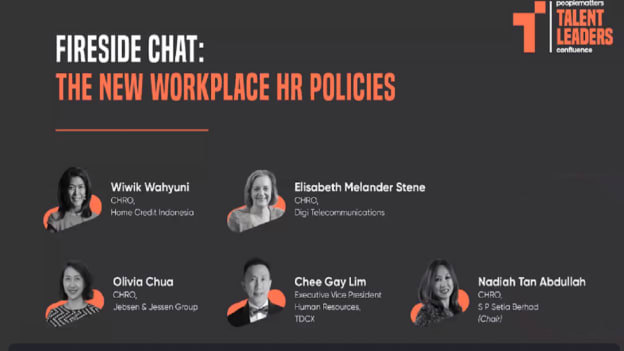The New Workplace HR policies: Insights from TLC

2020 is over but the lessons are here to stay forever. Businesses and HR had to deal with a multitude of challenges through the pandemic. Especially HR, which was at the forefront of this pandemic. HR and the policies implemented in the pandemic will change our world of work. What are these changes-what do these new policies look like?
In an interesting fireside chat at People Matters Talent Leaders Malaysia Confluence, leaders from some of Malaysia’s leading companies such as Wiwik Wayhyuni, CHRO, Home Credit Indonesia; Elisabeth Melander Stene, CHRO, Digi Telecommunications; Olivia Chua, CHRO, Jebsen & Jebsen Group; Chee Gay Lim, Executive VP, Human Resources, TDCX; and Nadiah Tan Abdullah, CHRO, S P Setia Berhard shared their insights and experiences from top on how they dealt with the challenges caused by the pandemic.
Nadiah Tan, who moderated the session kickstarted the discussion by quoting a Deloitte report which stated that all CHROs have to look into 5Rs- Reflect, Recommit, Reengage, Rethink and Reboot. As per Nadiah, the three principles of Purpose, Potential, and Perspective will help to draw a new plan for the organization when it comes to onboarding, hiring, employee experience, and optimizing workforce planning and strategy.
Pandemic-accelerated digital transformation fosters greater adoption
Taking the discussion forward, Olivia Chua stated shared that with Jebsen & Jebsen tracing its history back to19th century, the company has gone through all sorts of crises and dived straight into business continuity plans and tightening up hiring when the pandemic hit. In the last two years, the firm has embarked on a transformation journey which the pandemic accelerated. Virtual meetings that were not ever held before became the norm and were quickly adopted by people.
Secondly, the firm also focused on employer branding-through social media as well as focus on employee engagement and wellness was accelerated due to the pandemic.
Similar views were shared by Wiwik Wayhyuni who reiterated that while the pandemic had a knockout effect on business, being a lean and a digital organization had been part of Home Credit Indonesia’s plan for sustainable growth. COVID gave the necessary push to set the context for streamlining the organization while balancing the business need with the people's esteem, making sure they felt supported and appreciated.
Balancing business and people agenda by focusing on wellness
Throwing more light on how Digi Telecommunications balanced business and people agenda, Elisabeth Melander shared that being a critical services company, it adopted a hybrid way of work as not all people could work from home. The company critically focused on the health and wellbeing of both in-office and at-home employees, giving a lot of personal advice and protective equipment. The firm believes that if you are feeling healthy and safe and taken care of, you are better engaged.
The firm also turned to engagement activities on a digital platform to increase engagement further and roped in leaders to involve the teams. The firm also conducted digital health and wellness training for its employees, which also boosted engagement levels. Hence the ability to demonstrate care and concern and provide feedback became a key driver of engagement among its employees.
Rethinking and reimagining policies through technology
Sharing how technology played a part in reimagining policies at TDCX, Chee Gay Lim shared that TDCX managed to onboard 3,000 employees and is also set to set up virtual centers in India and Romania. The company has managed to make its hiring and onboarding 100% virtual. The company has saved a lot of time by cutting on hiring meetings by employing technology such as AI to analyze the candidates and their resumes. All the hiring goes through a video recording and candidates are scored against respective job profiles to see which profile best fits them. The technology is able to suggest whether they are suitable for customer success profile or sales. So if earlier, the company was spending 80% of the time meeting the candidates, now it spends 80% of the time on analyzing through technology and only 20% of the time meeting the candidate. Hence the company will rely further on Machine Learning to fine-tune its accuracy to take it to 90%.
Further, as communication has all gone virtual, the company is further rethinking its employee experience and trying to get a pulse survey done weekly among its employees, which was only done twice a year. This helps the company understand engagement much better, understand the feedback, and come up with an action plan. Again, AI is playing an important role in driving this initiative.
In conclusion, the leaders shared that the pandemic enforced the importance of resilience and adaptability, accelerated the conversation around mental health and required HR to be the caretakers even more than before, and rethink and reimagine.
















